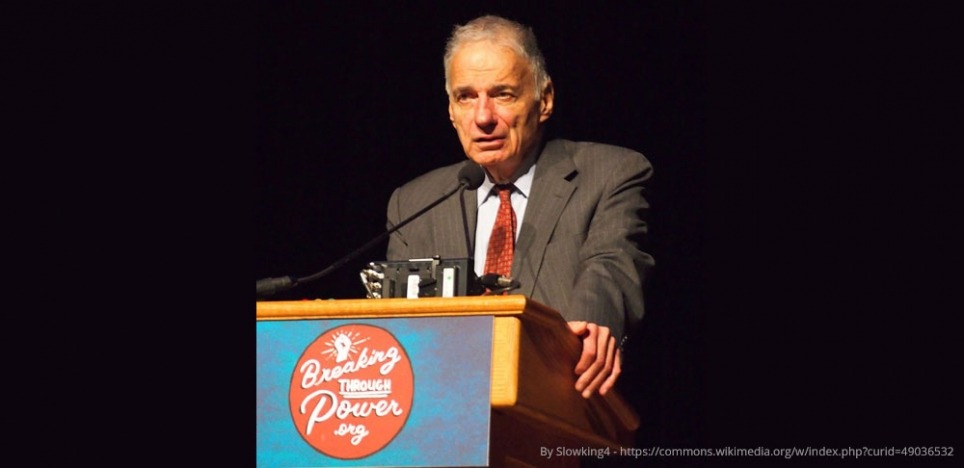For half a century, political activist and attorney Ralph Nader has challenged corporations, government, and other organizations to be more accountable to the public. His activism helped pass several landmark pieces of American consumer protection legislation including the Clean Water Act, the Freedom of Information Act, the Consumer Product Safety Act, the Foreign Corrupt Practices Act, the Whistleblower Protection Act, and the National Traffic and Motor Vehicle Safety Act.
Nader ran for President as a candidate for the Green Party in 2000. He contends that both the Republicans and the Democrats are proxies for big business. They have "given away the store" to corporations through tax breaks, deregulation, privatization, subsidies, reduced law enforcement, and limitations on law suits. Of course, his criticism of " the corporatization of America" doesn't sit well with the owners of the media. Nader's campaign was given very little media coverage despite the fact that a majority of voters polled in 1999 wanted a viable third party in America to keep the other two parties honest. Shut out of the presidential debates, Nader still managed to garner three million votes.
As a candidate, Nader vowed to serve the yearnings of all those who "see justice as the great work of human beings on Earth, who understand that community and individual fulfillment can be mutually reinforcing, who respect the urgent necessity to wage peace, to protect the environment, to end poverty, and to preserve values of the spirit for future generations." He has managed to further these goals in spite of not being elected, and remains a laudable example of integrity, diligence, conscience, and perseverance.
To Name This Day . . .
 Quotes
Quotes
In Told You So: The Big Book of Weekly Columns, Ralph Nader has gathered together more than 300 pieces on sustaining democracy, strengthening a society, and working against the mighty forces of corporate power and social cynicism. Excerpts from this book can be used as a portal to reflections on the spiritual practice of freedom and challenges to it. Take some quality time to reflect on Nader's words and write down ways in which they enhance your understanding of freedom and your commitment to preserve it.
The Constitution: "Our Constitution's preamble starts with 'we the people,' and ends without a single mention of corporations or political parties." (November 16, 2011 column)
On blocking freedom: "The political system is a two party dictatorship whose gerrymandering results in most electoral districts being one-party fiefdoms. The two parties block the freedom of third parties and independent candidates to have equal access to the ballots and to the debates." (February 18, 2011 column)
On democracy: "In a country that has so many problems it doesn't deserve and so many solutions that it doesn't apply, all things are possible when people begin looking at themselves for the necessary power to produce a just society." (February 18, 2011 column)
Stealing the future: "Mortgaging the future environmentally means that companies cut down forests, erode land, contaminate water and soil, deplete the oceans of fisheries and leave certain areas so toxic as to be uninhabitable for centuries. These devastations, along with the horrific global warming trend, deprive our children, grandchildren and their descendants of the enjoyment, use and custody of these life-sustaining natural resources." (February 17, 2006 column)
The human spark: "One must believe there is always a way to produce the human spark for a broader public morality and a deeper commitment to a more just society. Rosa Parks, hail to thee!" (July 30, 2008 column)
Overseas wars: "America's overseas wars have different outcomes when they have no constitutional authority, no war tax, no draft, no regular on-the-ground press coverage, no Congressional oversight, no spending accountability and, importantly, no affirmative consent of the governed who are, apart from military families, hardly noticing. . . . It is fought by war lords, militias, criminal gangs, and Special Forces discretionary death squads." (July 30, 2010 column)
A deeply divided nation: "Any way you slice the numbers, you get the same result: a deeply divided America with a struggling majority and a super-rich clique. It's a story of a gap between haves and have-nots more severe than anything this country has witnessed for a century." (September 5, 2004 column)
Corporate control: "The relentless expansion of corporate control over our political economy has proven nearly immune to daily reporting by the mainstream media. Corporate crime, fraud and abuse have become like the weather; everyone is talking about the storm but no one seems to do anything about it. Corporate capitalism has not succeeded even on its own theoretical terms. In the United States, government subsidies, and government bailouts keep capitalism working." (December 28, 2011 column)
